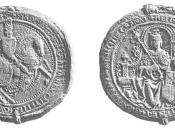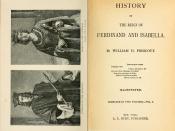Upon becoming the joint monarchs of Castile and Aragon, one of the main challenges that Ferdinand and Isabella faced was to extend the crown's authority over the Iberian peninsula thus increasing the stability of the kingdom and power of the crown. This was a daunting task, especially given the power of grandees such as Mendoza and Carillo at the time. The Catholic kings had some considerable success in consolidating royal authority, but there were limitations on this success and compromises were made; especially in the kingdom of Aragon. This will largely be an essay on Castile, as Castile was the dominant body in Spain, but I will consider the substantial differences in the administration and other areas of Aragon which, arguably, meant that the monarchs were considerably less successful at consolidating their authority there.
One key area in which the monarchs were successful is in extending the prestige of the crown and international respect for it.
One way in which they did this was via the direct use of strong personal authority. Particularly in the first half of their reign, a critical era for the crown when the civil war was coming to a close, the monarchs traveled across Spain carrying out various official duties such as administering justice. The fact that there were two monarchs effectively doubled the sense of personal presence that they could create. This was a source of morale in the civil war; lending somewhat of a feeling to loyal towns and villages that the queen was with them. This had a peace-time effect too: it has been remarked that "Few residents did not see Isabella at some time in their lives". This created a strong sense of ubiquity helping to instill a sense of loyalty in subjects and demonstrating, through the personal dispensation of...



Thx
very interesting, i completely agree!!!
2 out of 2 people found this comment useful.